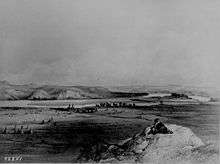Théophile Bruguier
Theophile Bruguier (August 31, 1813 – February 18, 1896) was a French-Canadian fur trader with the American Fur Company. Bruguier is credited as being the first white settler of what would become Sioux City, Iowa.
Biography

Bruguier was born near Montreal, Canada and was educated as an attorney. Soon after he began to practice law, Bruguier became engaged. However, when his fiancee died from cholera, the grieving Bruguier left Quebec to embark on a rugged life in the Missouri River country as a fur trader/interpreter with the American Fur Company. He was sent from the company's headquarters in St. Louis to Fort Pierre, Dakota Territory, arriving there January 1, 1836. Bruguier spoke French and English, and quickly learned the Dakota language of the Sioux Indians. He met and worked with the Yankton Sioux Chief War Eagle at that time. In the late 1840s, Bruguier established a farm and trading post at the confluence of the Big Sioux River and Missouri River, along with War Eagle and the chief's two daughters, to whom Bruguier was married. His original homestead claim extended from the Big Sioux to the Floyd River, land that became the original downtown, riverfront and residential area of the nascent Sioux City over the next two decades. After the death of War Eagle in 1851, Bruguier continued in the trade business, acting as an Indian commissioner and a wagon freighter. He was one of 17 people who cast their votes in the first election in Woodbury County in August, 1853. Following the deaths of his wives in the late 1850s, Bruguier married Victoria Turnott, a widow from St. Louis. In the 1860s, they settled on a 500-acre (2.0 km2) farm in the Salix, Iowa area. Bruguier died from pneumonia on February 18, 1896, and was interred at the Catholic cemetery near Salix. In 1926, he was re-buried near the grave of War Eagle.